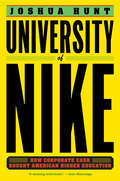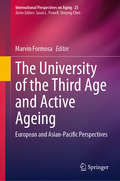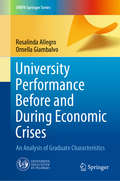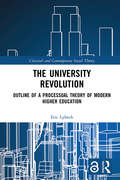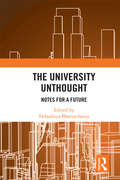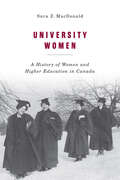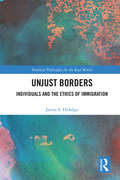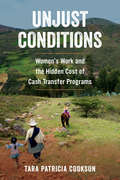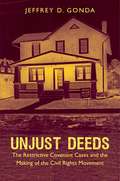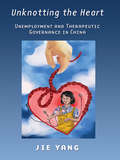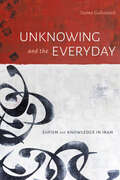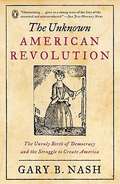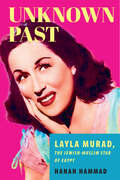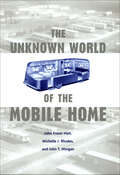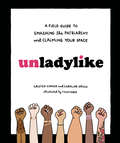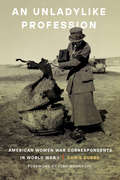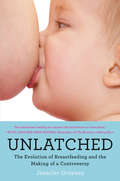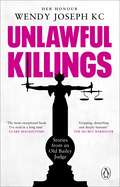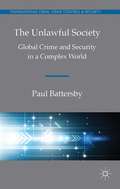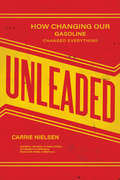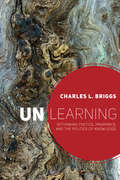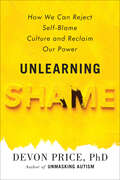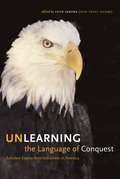- Table View
- List View
University of Nike: How Corporate Cash Bought American Higher Education
by Joshua HuntThe dramatic expose of how the University of Oregon sold its soul to Nike, and what that means for the future of our public institutions and our society. In the mid-1990s, facing severe cuts to its public funding, the University of Oregon—like so many colleges across the country—was desperate for cash. Luckily, the Oregon Ducks’ 1995 Rose Bowl berth caught the attention of the school’s wealthiest alumnus: Nike founder Phil Knight, who was seeking new marketing angles at the collegiate level. And so the University of Nike was born: Knight has so far donated more than half a billion dollars to the school in exchange for high-visibility branding opportunities. But as journalist Joshua Hunt shows in University of Nike, Oregon has paid dearly for the veneer of financial prosperity and athletic success that has come with this brand partnering. Hunt uncovers efforts to conceal university records, buried sexual assault allegations against university athletes, and cases of corporate overreach into academics and campus life—all revealing a university being run like a business, with America’s favorite “Shoe Dog” calling the shots. Nike money has shaped everything from Pac-10 television deals to the way the game is played, from the landscape of the campus to the type of student the university hopes to attract.More alarming still, Hunt finds other schools taking a page from Oregon’s playbook. Never before have our public institutions for research and higher learning been so thoroughly and openly under the sway of private interests, and never before has the blueprint for funding American higher education been more fraught with ethical, legal, and academic dilemmas. Encompassing more than just sports and the academy, University of Nike is a riveting story of our times.
The University of the Third Age and Active Ageing: European and Asian-Pacific Perspectives (International Perspectives on Aging #23)
by Marvin FormosaThis comparative resource charts the interface between the University of the Third Age (U3A) movement and active ageing, and in doing so, offers a comprehensive and thorough understanding of what U3A means in different geographical and sociocultural contexts. After first providing introductory chapters to introduce the U3A movement and active ageing in global perspective and tracing the origins of U3As in France, the book sets off charting the international development of U3As in both European and Asian-Pacific contexts. Deliberately, the book moves away from the dominant Anglo-centric US- and UK-rooted analyses of U3As to account for contexts of different political ideology, sociocultural values, geography, and degrees of urbanisation and industrialisation. Lastly, it thematises foreseeable issues, concerns, and predicaments that the global U3A movement faces while meeting the challenges and seizing the opportunities presented by active ageing.The chapters’ comparative perspectives encompass: Origins and development: The Francophone model of U3As The development and characteristics of U3As in European and Asian-Pacific geographies From social welfare to educational gerontology: U3As in China, Russia, Taiwan, Malaysia and South Korea U3As in Italy, Spain and Sweden: A dynamic, flexible, and accessible learning model Late-life learning for social inclusion: U3As in Poland, Iceland, United Kingdom, and Malta The U3A movement in Australia: From statewide networking to community engagement Cross-cultural perspectives on U3As: The case of Thailand The University of the Third Age and Active Ageing boasts welcome contributions to the scholarship on the different histories, structures, and challenges posed by national U3As. Readers from a variety of backgrounds and research interests including gerontology, geriatrics, active ageing, older adult learning, comparative education and educational technology will find this a necessary and valuable resource in better understanding a globalised U3A world."The University of the Third Age and Active Ageing: European and Asian-Pacific Perspectives contributes to the deep well of histories, experiences, structures, accomplishments and problems of national U3As. It emerges as a tapestry of extraordinary research that offers to guide the U3A movement as it soon enters its fiftieth year of existence." - Prof. Stephen Katz. Trent University
University Performance Before and During Economic Crises: An Analysis of Graduate Characteristics (UNIPA Springer Series)
by Rosalinda Allegro Ornella GiambalvoThis book briefly analyzes the performance of selected Italian universities during a pre-crisis period and an economic crisis period, on the basis of graduate characteristics and graduate placement statistics. The Electre model is used to produce eighteen university rankings according to three different scenarios (Neutral, University, and Job), three different roles ascribed to the key criteria (overeducation and mismatching), and two years corresponding to two postgraduation placement sampling surveys carried out in a pre-crisis period (2006) and during a crisis period (2011). The eighteen rankings are based on Economics/Statistics and Political & Social Sciences graduates. The rankings vary according to both the scenarios considered and graduate characteristics. Some differences are noted between the two fields of study. The book will be of interest for statisticians interested in evaluation issues, policymakers concerned with university comparisons and rankings, and future students and graduates wishing to make the best choice when selecting their university course. In addition, the new methodology adopted will be relevant for scholars in Statistics and Engineering.
The University Revolution: Outline of a Processual Theory of Modern Higher Education (Classical and Contemporary Social Theory)
by Eric LybeckFew institutions in modern society are as significant as universities, yet our historical and sociological understanding of the role of higher education has not been substantially updated for decades. By revisiting the emergence and transformation of higher education since 1800 using a novel processual approach, this book recognizes these developments as having been as central to constituting the modern world as the industrial and democratic revolutions. This new interpretation of the role of universities in contemporary society promises to re-orient our understanding of the importance of higher education in the past and future development of modern societies. It will therefore appeal to scholars of social science and history with interests in social history and social change, education, the professions and inequalities.
The University Unthought: Notes for a Future
by Debaditya BhattacharyaWhy is it important to have a revolutionary critical pedagogy? What are the new inter/disciplinary engagements possible within the university? What will it be like to live and learn in this university of the future? Drawing on these essential questions, this volume explores the political future(s) of the university. It does not take a simplistic recourse to the tenets of liberal democracy but seeks a more engaged positioning of the university space within everyday practices of the social. It cross-examines the history of this ‘ideal’ university’s relationship with the banal everyday, the ‘apolitical’ outside and what exceeds intellectual reason, to finally question if such historicizing of the university is necessary at all. Along with its companion The Idea of the University: Histories and Contexts, this brave new intervention makes a compelling foray into the political future(s) of the university. It will be of interest to academics, educators and students of the social sciences and humanities, especially education. It will also be of use to policy-makers and education analysts, and be central to the concerns of any citizen.
University Women: A History of Women and Higher Education in Canada (Carleton Library Series #257)
by Sara Z. MacDonaldBessie Scott, nearing the end of her first year at university in the spring of 1890, recorded in her diary: “Wore my gown for first time! It didn’t seem at all strange to do so.” Often deemed a cumbersome tradition by men, the cap and gown were dearly prized by women as an outward sign of their hard-won admission to the rank of undergraduates. For the first generations of university women, higher education was an exhilarating and transformative experience, but these opportunities would narrow in the decades that followed.In University Women Sara MacDonald explores the processes of integration and separation that marked women’s contested entrance into higher education. Examining the period between 1870 and 1930, this book is the first to provide a comparative study of women at universities across Canada. MacDonald concludes that women’s higher education cannot be seen as a progressive narrative, a triumphant story of trailblazers and firsts, of doors being thrown open and staying open. The early promise of equal education was not fulfilled in the longer term, as a backlash against the growing presence of women on campuses resulted in separate academic programs, closer moral regulation, and barriers that restricted their admission into the burgeoning fields of science, technology, engineering, and mathematics. The modernization of higher education ultimately marginalized women students, researchers, and faculty within the diversified universities of the twentieth century.University Women uncovers the systemic inequalities based on gender, race, and class that have shaped Canadian higher education. It is indispensable reading for those concerned with the underrepresentation of girls and women in STEM and current initiatives to address issues of access and equity within our academic institutions.
Unjust Borders: Individuals and the Ethics of Immigration (Political Philosophy for the Real World)
by Javier S. HidalgoStates restrict immigration on a massive scale. Governments fortify their borders with walls and fences, authorize border patrols, imprison migrants in detention centers, and deport large numbers of foreigners. Unjust Borders: Individuals and the Ethics of Immigration argues that immigration restrictions are systematically unjust and examines how individual actors should respond to this injustice. Javier Hidalgo maintains that individuals can rightfully resist immigration restrictions and often have strong moral reasons to subvert these laws. This book makes the case that unauthorized migrants can permissibly evade, deceive, and use defensive force against immigration agents, that smugglers can aid migrants in crossing borders, and that citizens should disobey laws that compel them to harm immigrants. Unjust Borders is a meditation on how individuals should act in the midst of pervasive injustice.
Unjust Conditions: Women's Work and the Hidden Cost of Cash Transfer Programs
by Tara Patricia CooksonA free ebook version of this title is available through Luminos, University of California Press’s Open Access publishing program. Visit www.luminosoa.org to learn more.Unjust Conditions follows the lives and labors of poor mothers in rural Peru, richly documenting the ordeals they face to participate in mainstream poverty alleviation programs. Championed by behavioral economists and the World Bank, conditional cash transfer (CCT) programs are praised as efficient mechanisms for changing poor people's behavior. While rooted in good intentions and dripping with the rhetoric of social inclusion, CCT programs' successes ring hollow, based solely on metrics for children’s attendance at school and health appointments. Looking beyond these statistics reveals a host of hidden costs for the mothers who meet the conditions. With a poignant voice and keen focus on ethnographic research, Tara Patricia Cookson turns the reader’s gaze to women’s care work in landscapes of grossly inadequate state investment, cleverly drawing out the tensions between social inclusion and conditionality.
Unjust Deeds
by Jeffrey D. GondaIn 1945, six African American families from St. Louis, Detroit, and Washington, D.C., began a desperate fight to keep their homes. Each of them had purchased a property that prohibited the occupancy of African Americans and other minority groups through the use of legal instruments called racial restrictive covenants--one of the most pervasive tools of residential segregation in the aftermath of World War II. Over the next three years, local activists and lawyers at the NAACP fought through the nation's courts to end the enforcement of these discriminatory contracts. Unjust Deeds explores the origins and complex legacies of their dramatic campaign, culminating in a landmark Supreme Court victory in Shelley v. Kraemer (1948). Restoring this story to its proper place in the history of the black freedom struggle, Jeffrey D. Gonda's groundbreaking study provides a critical vantage point to the simultaneously personal, local, and national dimensions of legal activism in the twentieth century and offers a new understanding of the evolving legal fight against Jim Crow in neighborhoods and courtrooms across America.
Unknotting the Heart: Unemployment and Therapeutic Governance in China
by Jie YangSince the mid-1990s, as China has downsized and privatized its state-owned enterprises, severe unemployment has created a new class of urban poor and widespread social and psychological disorders. In Unknotting the Heart, Jie Yang examines this understudied group of workers and their experiences of being laid off, "counseled," and then reoriented to the market economy. Using fieldwork from reemployment programs, community psychosocial work, and psychotherapy training sessions in Beijing between 2002 and 2013, Yang highlights the role of psychology in state-led interventions to alleviate the effects of mass unemployment. She pays particular attention to those programs that train laid-off workers in basic psychology and then reemploy them as informal "counselors" in their capacity as housemaids and taxi drivers. These laid-off workers are filling a niche market created by both economic restructuring and the shortage of professional counselors in China, helping the government to defuse intensified class tension and present itself as a nurturing and kindly power. In reality, Yang argues, this process creates both new political complicity and new conflicts, often along gender lines. Women are forced to use the moral virtues and work ethics valued under the former socialist system, as well as their experiences of overcoming depression and suffering, as resources for their new psychological care work. Yang focuses on how the emotions, potentials, and "hearts" of these women have become sites of regulation, market expansion, and political imagination.
Unknowing and the Everyday: Sufism and Knowledge in Iran
by Seema GolestanehIn Unknowing and the Everyday Seema Golestaneh examines how Sufi mystical experience in Iran shapes contemporary life. Central to this process is ma’rifat, or “unknowing”—the idea that, as it is ultimately impossible to fully understand the divine, humanity must operate from an engaged awareness that it knows nothing. Golestaneh shows that rather than considering ma’rifat an obstacle to intellectual engagement, Sufis embrace that there will always be that which they do not know. From this position, they affirm both the limits of human knowledge and the mysteries of the profane world. Through ethnographic case studies, Golestaneh traces the affective and sensory dimensions of ma’rifat in contexts such as the creation of collective Sufi spaces, the interpretation of Persian poetry, formulations of selfhood and non-selfhood, and the navigation of the socio-material realm. By outlining the relationship between ma’rifat and religious, aesthetic, and social life in Iran, Golestaneh demonstrates that for Sufis the outer bounds of human thought are the beginning rather than the limit.
The Unknown American Revolution: The Unruly Birth of Democracy and the Struggle to Create America
by Gary B. NashIn this audacious recasting of the American Revolution, distinguished historian Gary Nash offers a profound new way of thinking about the struggle to create this country, introducing readers to a coalition of patriots from all classes and races of American society. From millennialist preachers to enslaved Africans, disgruntled women to aggrieved Indians, the people so vividly portrayed in this book did not all agree or succeed, but during the exhilarating and messy years of this country's birth, they laid down ideas that have become part of our inheritance and ideals toward which we still strive today.
The Unknown Internment: An Oral History of the Relocation of Italian Americans during World War II
by Stephen FoxFox combines extensive interviews with internees with research of government files and newspaper accounts to tell the little-known story of the 1942 forced relocation of Italian aliens from California to "safe zones".
Unknown Past: Layla Murad, the Jewish-Muslim Star of Egypt
by Hanan HammadA biography of the "Cinderella" of Egyptian cinema—the veneration and rumors that surrounded an unparalleled career, and the gendered questions that unsettled Egyptian society. Layla Murad (1918-1995) was once the highest-paid star in Egypt, and her movies were among the top-grossing in the box office. She starred in 28 films, nearly all now classics in Arab musical cinema. In 1955 she was forced to stop acting—and struggled for decades for a comeback. Today, even decades after her death, public interest in her life continues, and new generations of Egyptians still love her work. Unknown Past recounts Murad's extraordinary life—and the rapid political and sociocultural changes she witnessed. Hanan Hammad writes a story centered on Layla Murad's persona and legacy, and broadly framed around a gendered history of twentieth-century Egypt. Murad was a Jew who converted to Islam in the shadow of the first Arab-Israeli war. Her career blossomed under the Egyptian monarchy and later gave a singing voice to the Free Officers and the 1952 Revolution. The definitive end of her cinematic career came under Nasser on the eve of the 1956 Suez War. Egyptians have long told their national story through interpretations of Murad's life, intertwining the individual and Egyptian state and society to better understand Egyptian identity. As Unknown Past recounts, there's no life better than Murad's to reflect the tumultuous changes experienced over the dramatic decades of the mid-twentieth century.
The Unknown World of the Mobile Home (Creating the North American Landscape)
by John Fraser Hart Michelle J. Rhodes John T. MorganIn American popular imagination, the mobile home evokes images of cramped interiors, cheap materials, and occupants too poor or unsavory to live anywhere else. Since the 1940s and '50s, however, mobile home manufacturers have improved standards of construction and now present them as an affordable alternative to conventional site-built homes. Today one of every fourteen Americans lives in a mobile home. In The Unknown World of the Mobile Home authors John Fraser Hart, Michelle J. Rhodes, and John T. Morgan illuminate the history and culture of these often misunderstood domiciles. They describe early mobile homes, which were trailers designed to be pulled behind automobiles and which were more often than not poorly constructed and unequal to the needs of those who used them. During the 1970s, however, Congress enacted federal standards for the quality and safety of mobile homes, which led to innovation in design and the production of much more attractive and durable models. These models now comply with local building codes and many are designed to look like conventional houses. As a result, one out every five new single-family housing units purchased in the United States is a mobile home, sited everywhere from the conventional trailer park to custom-designed "estates" aimed at young couples and retirees. Despite all these changes in manufacture and design, even the most immobile mobile homes are still sold, financed, regulated, and taxed as vehicles.With a wealth of detail and illustrations, The Unknown World of the Mobile Home provides readers with an in-depth look into this variation on the American dream.
The Unknown World of the Mobile Home (Creating the North American Landscape)
by John Fraser Hart Michelle J Rhodes John T MorganAn in-depth look at the history and culture of mobile homes in the United States.In American popular imagination, the mobile home evokes images of cramped interiors, cheap materials, and occupants too poor or unsavory to live anywhere else. Since the 1940s and ‘50s, however, mobile home manufacturers have improved standards of construction and now present them as an affordable alternative to conventional site-built homes. Today one of every fourteen Americans lives in a mobile home.In The Unknown World of the Mobile Home authors John Fraser Hart, Michelle J. Rhodes, and John T. Morgan illuminate the history and culture of these often misunderstood domiciles. They describe early mobile homes, which were trailers designed to be pulled behind automobiles and which were more often than not poorly constructed and unequal to the needs of those who used them. During the 1970s, however, Congress enacted federal standards for the quality and safety of mobile homes, which led to innovation in design and the production of much more attractive and durable models. These models now comply with local building codes and many are designed to look like conventional houses. As a result, one out every five new single-family housing units purchased in the United States is a mobile home, sited everywhere from the conventional trailer park to custom-designed “estates” aimed at young couples and retirees. Despite all these changes in manufacture and design, even the most immobile mobile homes are still sold, financed, regulated, and taxed as vehicles.With a wealth of detail and illustrations, The Unknown World of the Mobile Home provides readers with an in-depth look into this variation on the American dream.“A clear, concise, and innovative look at the history, the economics, and the politics of the mobile home. The authors reveal the inner workings of mobile home living by drawing upon a wide variety of sources, from industry data to interviews conducted at mobile home parks across the country. Further, they explore new types of mobile home communities—those assembled for workers at meat-processing centers in southwest Kansas, for example—that complicate the familiar image of the mobile home park as retirement village. The ideas presented in this book provide a solid starting point for many detailed studies on this important topic.” —Karl Raitz, University of Kentucky, author of The National Road
Unladylike: A Field Guide to Smashing the Patriarchy and Claiming Your Space
by Cristen Conger Caroline ErvinA funny, fact-driven, and illustrated field guide to how to live a feminist life in today's world, from the hosts of the hit Unladylike podcast.Get ready to get unladylike with this field guide to the what's, why's, and how's of intersectional feminism and practical hell-raising. Through essential, inclusive, and illustrated explorations of what patriarchy looks like in the real world, authors and podcast hosts Cristen Conger and Caroline Ervin blend wild histories, astounding stats, social justice principles, and self-help advice to connect where the personal meets political in our bodies, brains, booty calls, bank accounts, and other confounding facets of modern woman-ing and nonbinary-ing. By laying out the uneven terrain of double-standards, head games, and handouts patriarchy has manspread across society for ages, Unladylike is here to unpack our gender baggage and map out the space that's ours to claim.
An Unladylike Profession: American Women War Correspondents in World War I
by Chris DubbsWhen World War I began, war reporting was a thoroughly masculine bastion of journalism. But that did not stop dozens of women reporters from stepping into the breach, defying gender norms and official restrictions to establish roles for themselves—and to write new kinds of narratives about women and war. Chris Dubbs tells the fascinating stories of Edith Wharton, Nellie Bly, and more than thirty other American women who worked as war reporters. As Dubbs shows, stories by these journalists brought in women from the periphery of war and made them active participants—fully engaged and equally heroic, if bearing different burdens and making different sacrifices. Women journalists traveled from belligerent capitals to the front lines to report on the conflict. But their experiences also brought them into contact with social transformations, political unrest, labor conditions, campaigns for women&’s rights, and the rise of revolutionary socialism. An eye-opening look at women&’s war reporting, An Unladylike Profession is a portrait of a sisterhood from the guns of August to the corridors of Versailles. Purchase the audio edition.
Unlatched: The Evolution of Breastfeeding and the Making of a Controversy
by Jennifer GraysonFrom an environmental journalist and mother of two young breast-fed children comes this searing, insightful look into the breastfeeding controversy and puts "common knowledge" about this most natural of processes to the test by breaking down the complex cultural, corporate, political, and technological factors that have transformed the way people think about breastfeeding and the human experience.Since the rise of infant formula in the early twentieth century, breastfeeding has gone from a basic biological function to a never-ending controversy and hot topic in the media: an Instagram photo of Blake Lively breastfeeding her daughter gained 367,000 likes and was posted across media sites from USA Today to Us Weekly. A photo of an Argentinian politician breastfeeding her 8-month-old during a session of Parliament quickly went viral, drawing a mix of support and criticism. Target's breastfeeding policy, allowing women to nurse in any area of the store, was recently shared on Facebook to praise from mothers across America. Clearly, this is a topic that constantly makes headlines and sparks heated discussion throughout the world. Growing up, Jennifer Grayson thought nothing of the fact that her mother had not breastfed her. It wasn't until she became a mother herself that she realized she had missed out on a natural, profound, and incredibly important experience, one that she became determined to give to her own children. Her curiosity about breastfeeding soon turned to passion, leading her to launch a worldwide search for knowledge and stories of breastfeeding. From biblical times to eighteenth century France, from modern-day Mongolia to inner-city Los Angeles, Grayson explores the personal stories of breastfeeding women throughout history around the world. Along the way, she takes readers behind the scenes at a lactation research laboratory, interviews controversial breastfeeding figures including Dr. William Sears, and shares her own personal experience of extended breastfeeding her preschool and toddler daughters. Unlatched is a thorough and fascinating study of one of the most contentious issues affecting society today.
Unlawful Killings: Life, Love and Murder: Trials at the Old Bailey - The instant Sunday Times bestseller
by Her Honour Wendy JosephTHE INSTANT SUNDAY TIMES BESTSELLERWINNER OF THE CWA GOLD DAGGER FOR NON-FICTION 2023'Wendy Joseph's gripping account of the law at work reads like a cliffhanger.' Sunday Times'Absolutely superb. 5 stars for sheer readability alone. Her Honour entertains as she educates us about murder, about the law and about how we human beings are shaped as we create the culture we live with.' PHILIPPA PERRY, author of THE BOOK YOU WISH YOUR PARENTS HAD READ___________________________________________________________________________________'Every day in the UK lives are suddenly, brutally, wickedly taken away. Victims are shot or stabbed. Less often they are strangled or suffocated or beaten to death. Rarely they are poisoned, pushed off high buildings, drowned or set alight. Then there are the many who are killed by dangerous drivers, or corporate gross negligence. There are a lot of ways you can kill someone. I know because I've seen most of them at close quarters.'High-profile murder cases all too often grab our attention in dramatic media headlines - for every unlawful death tells a story. But, unlike most of us, a judge doesn't get to turn the page and move on. Nor does the defendant, or the family of the victim, nor the many other people who populate the court room.And yet, each of us has a vested interest in what happens there. And while most people have only the sketchiest idea of what happens inside a Crown Court, any one of us could end up in the witness-box or even in the dock.With breath-taking skill and deep compassion, the author describes how cases unfold and illustrates exactly what it's like to be a murder trial judge and a witness to human good and bad. Sometimes very bad.The fracture lines that run through our society are becoming harder and harder to ignore. From a unique vantage point, the author warns that we do so at our peril._____________________________________________________________________________________________'The most exceptional book I have read in a long time.' CLARE MACKINTOSH'A very rare gem. written with authority, humility and compassion. Compellingly clever and sharply honest.' PROFESSOR DAME SUE BLACK, author of ALL THAT REMAINS'Riveting, thought-provoking, and very, very entertaining. I loved it.' RODDY DOYLE'Will make you question all the fundamentals that you've come to take for granted about offenders, the crimes that they commit - especially murder - and the punishment they deserve. A page turner that will leave you wanting to know more.' EMERITUS PROFESSOR DAVID WILSON, author of MY LIFE WITH MURDERERSThe instant Sunday Times bestseller, March 2023
The Unlawful Society
by Paul BattersbyExploring the dynamics of law-making in a world where the pace of technological change is outstripping our capacity to capture new forms of transnational crime, this book uses the innovative concept of unlawfulness to examine the crimes of the global overworld, forming a unique analysis of global order in the twenty-first century.
Unleaded: How Changing Our Gasoline Changed Everything
by Carrie NielsenWhen leaded gasoline was first developed in the 1920s, medical experts were quick to warn of the public health catastrophes it would cause. Yet government regulators did not heed their advice, and for more than half a century, nearly all cars used leaded gasoline, which contributed to a nationwide epidemic of lead poisoning. By the 1970s, 99.8% of American children had significantly elevated levels of lead in their blood. Unleaded tells the story of how crusading scientists and activists convinced the U.S. government to ban lead additives in gasoline. It also reveals how, for nearly fifty years, scientific experts paid by the oil and mining industries abused their authority to convince the public that leaded gasoline was perfectly harmless. Combining environmental history, sociology, and neuroscience, Carrie Nielsen explores how lead exposure affects the developing brains of children and is linked to social problems including academic failure, teen pregnancies, and violent crime. She also shows how, even after the nationwide outrage over Flint’s polluted water, many poor and minority communities and communities of color across the United States still have dangerously high lead levels. Unleaded vividly depicts the importance of sound science and strong environmental regulations to protect our nation’s most vulnerable populations.
Unlearning: Rethinking Poetics, Pandemics, and the Politics of Knowledge
by Charles L. BriggsA provocative theoretical synthesis by renowned folklorist and anthropologist Charles L. Briggs, Unlearning questions intellectual foundations and charts new paths forward. Briggs argues, through an expansive look back at his own influential works as well as critical readings of the field, that scholars can disrupt existing social and discourse theories across disciplines when they collaborate with theorists whose insights are not constrained by the bounds of scholarship. Eschewing narrow Eurocentric modes of explanation and research foci, Briggs brings together colonialism, health, media, and psychoanalysis to rethink classic work on poetics and performance that revolutionized linguistic anthropology, folkloristics, media studies, communication, and other fields. Beginning with a candid memoir that credits the mentors whose disconcerting insights prompted him to upend existing scholarly approaches, Briggs combines his childhood experiences in New Mexico with his work in graduate school, his ethnography in Venezuela working with Indigenous peoples, and his contemporary work—which is heavily weighted in medical folklore. Unlearning offers students, emerging scholars, and veteran researchers alike a guide for turning ethnographic objects into provocations for transforming time-worn theories and objects of analysis into sources of scholarly creativity, deep personal engagement, and efforts to confront unconscionable racial inequities. It will be of significant interest to folklorists, anthropologists, and social theorists and will stimulate conversations across these disciplines.
Unlearning Shame: How We Can Reject Self-Blame Culture and Reclaim Our Power
by Devon PriceLearn to identify—and combat—Systemic Shame, the feeling of self-hatred and disempowerment that comes from living in a society that blames individuals for systemic problems, with this invaluable resource from the social psychologist and author of Unmasking Autism.&“Stop doomscrolling and read this book. You&’ll feel better, I promise.&”—Celeste Headlee, journalist and bestselling authorSystemic Shame is the socially engineered self-loathing that says we are solely to blame for our circumstances. It tells us that poverty is remedied by hard-working people pulling themselves up by their bootstraps, that marginalized people are personally responsible for solving the problem of their own oppression, and that massive global crises like climate change can be solved with individual action. Feeling overwhelmed? That&’s your problem, too. The more we try and ultimately fail to live up to impossible societal standards of moral goodness, the more shame we feel—and the more we retreat into isolation and despair.Social psychologist Dr. Devon Price knows firsthand the destructive effects of Systemic Shame; he experienced shame and self-hatred as he grappled with his transgender identity, feeling as if his suffering was caused by his own actions rather than systems like cissexism. And it doesn&’t just end with internal feelings of anguish. It causes us to judge other people the same way we fear being judged, which blocks us from seeking out the acceptance and support we need and discourages us from trying to improve our communities and our relationships.In Unlearning Shame, Dr. Price explores how we can deal with those hard emotions more effectively, tackling the societal shame we&’ve absorbed and directed at ourselves. He introduces the antidote to Systemic Shame: expansive recognition, an awareness of one&’s position in the larger social world and the knowledge that our battles are only won when they are shared. He provides a suite of exercises and resources designed to combat Systemic Shame on a personal, interpersonal, and global level through rebuilding trust in yourself, in others, and in our shared future.By offering a roadmap to healing and a toolkit of actionable items, Unlearning Shame helps us reject hopelessness and achieve sustainable change and personal growth.
Unlearning the Language of Conquest
by Wahinkpe Topa Aka Don Trent JacobsResponding to anti-Indianism in America, the wide-ranging perspectives culled in Unlearning the Language of Conquest present a provocative account of the contemporary hegemony still at work today, whether conscious or unconscious. Four Arrows has gathered a rich collection of voices and topics, including: • Waziyatawin Angela Cavender Wilson's "Burning Down the House: Laura Ingalls Wilder and American Colonialism," which probes the mentality of hatred woven within the pages of this iconographic children's literature. • David N. Gibb's "The Question of Whitewashing in American History and Social Science," featuring a candid discussion of the spurious relationship between sources of academic funding and the types of research allowed or discouraged • Barbara Alice Mann's "Where Are Your Women? Missing in Action," displaying the exclusion of Native American women in curricula that purport to illuminate the history of Indigenous Peoples. Bringing to light crucial information and perspectives on an aspect of humanity that pervades not only U. S. history but also current sustainability, sociology, and the ability to craft accurate understandings of the population as a whole, Unlearning the Language of Conquest yields a liberating new lexis for realistic dialogues.
